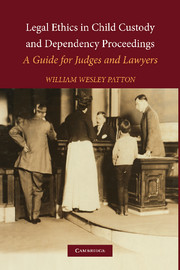Book contents
- Frontmatter
- Contents
- Foreword, by Martin Guggenheim
- Acknowledgments
- Introduction
- 1 Conflicts of Interest
- 2 Competent and Zealous Representation
- 3 Confidentiality
- 4 The Ethics of Alternative Dispute Resolution in Child Custody and Dependency Proceedings
- 5 Ethical Considerations and Constraints in Child Custody and Dependency Appeals
- 6 The Constitutionality of Legislative and Executive Regulation of the Practice of Law and Defining the Attorney-Client Relationship
- Appendix A National Association of Counsel for Children Standards
- Appendix B American Bar Association Standards of Practice for Lawyers Who Represent Children in Abuse and Neglect Cases
- Appendix C In re Car Simulation and Analysis
- Other Authorities
- Cases and Ethics Opinions
- Index
1 - Conflicts of Interest
Published online by Cambridge University Press: 24 July 2009
- Frontmatter
- Contents
- Foreword, by Martin Guggenheim
- Acknowledgments
- Introduction
- 1 Conflicts of Interest
- 2 Competent and Zealous Representation
- 3 Confidentiality
- 4 The Ethics of Alternative Dispute Resolution in Child Custody and Dependency Proceedings
- 5 Ethical Considerations and Constraints in Child Custody and Dependency Appeals
- 6 The Constitutionality of Legislative and Executive Regulation of the Practice of Law and Defining the Attorney-Client Relationship
- Appendix A National Association of Counsel for Children Standards
- Appendix B American Bar Association Standards of Practice for Lawyers Who Represent Children in Abuse and Neglect Cases
- Appendix C In re Car Simulation and Analysis
- Other Authorities
- Cases and Ethics Opinions
- Index
Summary
It might seem unusual for a book on legal ethics to begin with the complicated issue of conflicts of interest. However, if an attorney waits until after the initial client interview to determine whether a conflict exists or is likely to develop during representation, the attorney might prejudice the client by having to conflict off the case at some later time. Conflicting off the case will not only lengthen the litigation time-line by requiring another attorney to prepare the case but also will increase the client's emotional trauma inherent in contested litigation. Therefore, before an attorney considers the detailed facts inherent in any case, engages in an intake or initial client interview, and even reviews all the available evidence, counsel should consider actual and potential conflicts of interest. Furthermore, it is essential for counsel to continually assess conflicts questions until the completion of the client's representation.
CHILDREN'S ATTORNEYS: POTENTIAL DIVIDED LOYALTIES
Because of the tremendous expense of representing parties in child dependency cases, one money-saving shortcut is to use a system in which a single legal office represents multiple parties. For instance, a government attorney office, such as a county counsel, district attorney, or public defender office, might represent parents, children, and/or the Department of Child and Family Services in different cases. However, because of the possibility of conflicts of interest, disclosure of confidential data, and breaches of loyalty, such multiparty representation usually violates the canon of ethics.
- Type
- Chapter
- Information
- Legal Ethics in Child Custody and Dependency ProceedingsA Guide for Judges and Lawyers, pp. 7 - 26Publisher: Cambridge University PressPrint publication year: 2006



